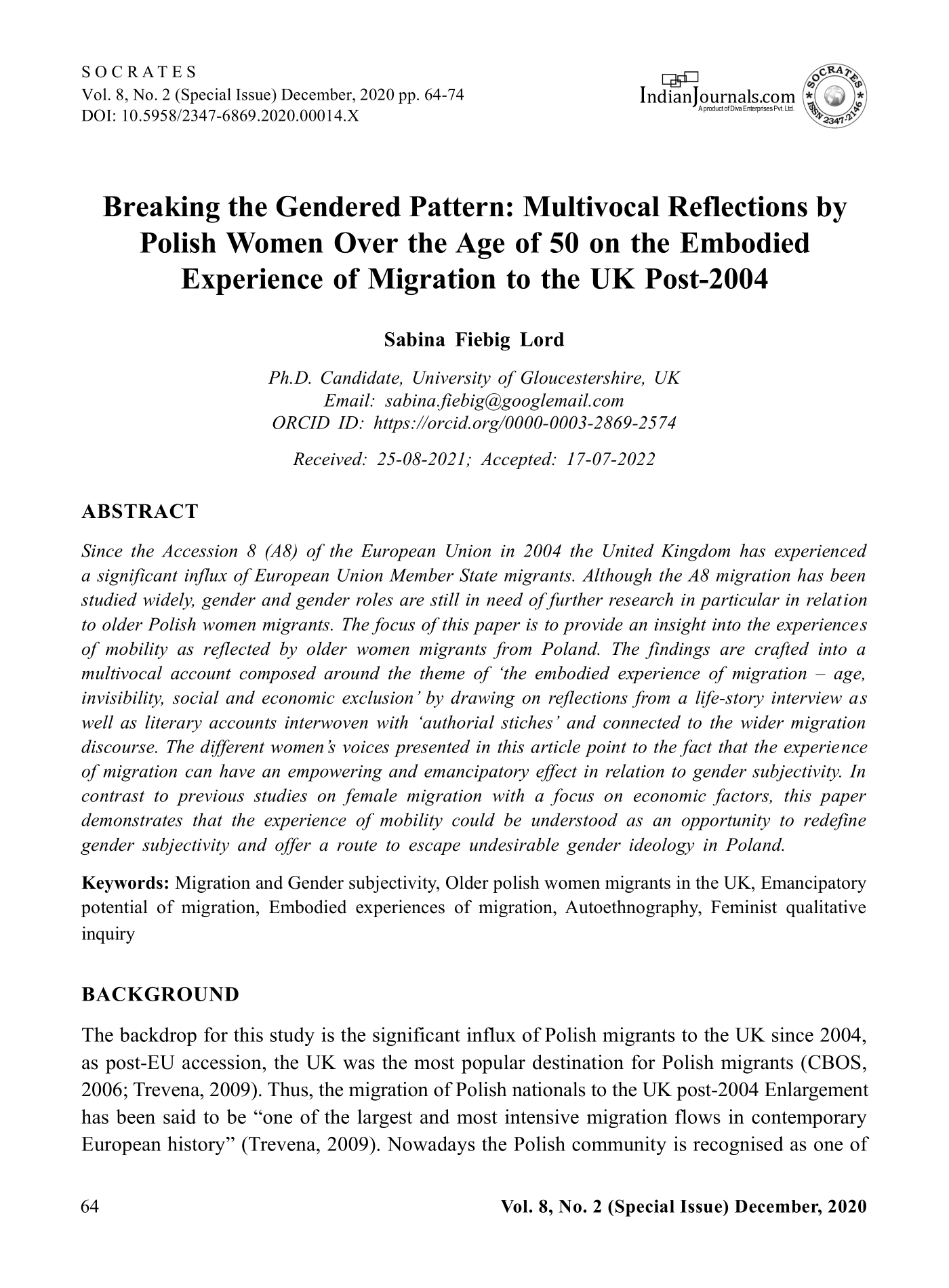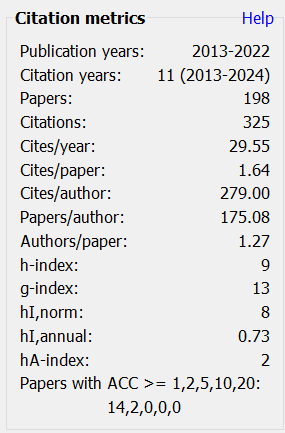Breaking the Gendered Pattern
Multivocal Reflections by Polish Women Over the Age of 50 on the Embodied Experience of Migration to the UK Post-2004
DOI:
https://doi.org/10.5958/2347-6869.2020.00014.XKeywords:
migration and gender subjectivity, older Polish women migrants in the UK, emancipatory potential of migration, embodied experiences of migration, autoethnography, feminist qualitative inquiryAbstract
Since the Accession 8 (A8) of the European Union in 2004 the United Kingdom has experienced a significant influx of European Union Member State migrants. Although the A8 migration has been studied widely, gender and gender roles are still in need of further research in particular in relation to older Polish women migrants. The focus of this paper is to provide an insight into the experiences of mobility as reflected by older women migrants from Poland. The findings are crafted into a multivocal account composed around the theme of ‘the embodied experience of migration – age, invisibility, social and economic exclusion’ by drawing on reflections from a life-story interview as well as literary accounts interwoven with ‘authorial stiches’ and connected to the wider migration discourse. The different women’s voices presented in this article point to the fact that the experience of migration can have an empowering and emancipatory effect in relation to gender subjectivity. In contrast to previous studies on female migration with a focus on economic factors, this paper demonstrates that the experience of mobility could be understood as an opportunity to redefine gender subjectivity and offer a route to escape undesirable gender ideology in Poland.
Downloads
Metrics
References
Ahmed, S. (2006). Queer phenomenology: orientations, objects, others. London: Duke University Press.
Anderson, B., Ruhs, M., Rogaly, B., & Spencer, S. (2006). Fair enough? Central and East European migrants in low-wage employment in the UK. London : Joseph Rowntree Foundation.
Bielawska, A. (2018). Experiences of older Polish migrants in the United Kingdom. Migration Studies– Review of Polish Diaspora, 2(168), 9-30.
Bordo, S. (1993). Unbearable Weight. London: University of California Press.
Braidotti, R. (1994). Nomadic Subjects: embodiement and sexual difference in contemporary feminist theory (2nd ed.). New York: Columbia University Press.
Burrell, K. (2011). Migration to the UK from Poland: Continuity and Change in East-West. Ashgate. Retrieved from http://www.ashgate.com/pdf/SamplePages/Polish_Migration_to_the_UK_in_the_New_Europ
CBOS. (2006). Kobiety i mezczyzni o podziale obowiazków domowych. Komunikat z badañ.Warszawa. Retrieved from http://www.bezuprzedzen.org/doc/kobiety_i_mezczyzni_o_podziale_obowiazkow_domowyc
Chowaniec, U. (2015). Melancholic Migrating Bodies in Contemporary Polish Women’s Writing. Newcastel Upon Tyne: Cambridge Scholars Publishing.
Datta, K. M. (2006). Work and survival strategies among low paid migrants in London. London: Queen Marry University of London.
Deleuze, G., & Guattari, F. (1988). A Thousand Plateaus-Capitalism and Schicophrenia. London: The Athlone Press.
Drinkwater, S., Eade, J., & Garapich, M. (2006). Poles Apart? EU Enlargement and the Labour Market Outcomes of Immigrants in the UK. In IZA Discussion Paper No. 2410. Bonn.
Ellis, C. (2004). The ethnographic I: A methodological novel about autoethnography. Walnut Creek.
Flannery, M. C. (2001). Quilting : A Feminist Metaphore for Scientific Inquiry. Qualitative Inquiry, 7(5), 628-645.
Furman, F. (2013). Facing the mirror: Older women and beauty shop culture. Routledge.
Gilpin, N. H. (2006). The impact of Free Movement of Workers from Central and Eastern Europe on the UK Labour Market. In Department of Work and Pensions Working Paper No. 29. Department of Work and Pensions.
Gimlin, D. (2002). Body Work: Beauty and Self-Image in American Culture. London: University of California Press.
Glass, C.; & Fodor, E. (2007). From public to private maternalism? Gender and welfare in Poland and Hungary after 1989. Social Politics: International Studies in Gender, State and Society Advance, 14(3), 323-350.
Grabowska, M. (2012). Bringing the Second World In: Conservative Revolution(s), Socialist Legacies, and Transnational Silences in the Trajectories of Polish Feminism. Signs: Journal of Women in Culture and Society, 37(2), 385-411.
Grabowska-Lusiñska, I., & M., O. (2008). Migracja z Polski po 1 maja 2004 r. jej intensywnooeæ i kierunki geograficzne oraz alokacja migrantów na rynkach pracy krajów Unii Europejskiej. In Centre of Migration Research, CMR Working Paper No 33/9. Warsaw: Warsaw University.
Gullette, M. (1997). Declining to decline: Cultural combat and the politics of the midlife. VA: University Press of Virginia Charlottesville.
Hofmeier, S. M., Runfola, C. D., Sala, M., Gagne, D. A., Brownley, K. A., & Bulik, C. M. (2017). Body image, aging, and identity in women over 50: The Gender and Body Image (GABI) study. Journal of women & aging, 29(1), 3–14. https://doi.org/10.1080/08952. Journal of women & aging, 29(1), 3–14, 29(1), 3-14.
Isañski, J.; & Luczys, P. (2011). Introduction. In Selling One’s Favourite Piano to Emigrate, (pp. xixxiv). Newcastle upon Tyne: Cambridge Scholars.
Janta, H. (2007). The experience of Polish Migrants working in the hospitality industry in the UK. European Migration to the UK and Ireland symposium, De Montfort University.
LaFont, S. (2001). One Step forward, two steps back: women in the post-communist states. Communist and Post-Communist Studies, 34, 203-220.
Lopez Rodriguez, M. (2010). Migration and a quest for ‘normalcy’. Polish migrant mothers and the capitalization of meritocratic opportunities in the UK. Social Identities, 16(3), 339-358.
Mulvey, L. (1975). Visual Pleasure and Narrative Cinema. Screen, 16, 6-18.
Nettleton S., & Watson J. (1998). The body in everyday life. Psychology Press.
Novikova, K. (2017). Mohair Berets”: Media Representations of Elderly Right-Wing Women and Aestheticization of Age in Poland. In Koettig et al., Gender and Far Right Politics in Europe. Springer Palgrave Macmillan.
Nowak, J. (2010). Opowieoeæ emigracyjna [An Emigration Tale] . Gdynia: Novae Res.
ONS, O. F. (2006). Employment, 15.2.2006. London: ONS.
ONS. (2011). Annual Population Survey (APS). Office for National Statistics. Retrieved from http://www.ons.gov.uk/ons/search/index.html?newquery=annual+population+survey
Pemberton, S., & Scullion, L. (2013). The Policies and Politics of Managed Migration: Exploring Mature Labour Migration from Central and Eastern Europe into the UK. Journal of Ethnic and Migration Studies, 1-19. doi:10.1080/1369183X.2013.733863
Riley, S.; Evans, A.; & Mackiewic, A. (2015). It’s just between girls: Negotiating the postfeminist gaze in women’s ‘looking talk’. Feminist Psychology, 26, 94-113.
Slany, K. (2008). Co to znaczy byæ migrantka? In K. Slany (Ed.), Migracje kobiet: Perspektywa wielowymiarowa (pp. 7-28). Kraków: Wydawnictwo Uniwersytetu Jagielloñskiego.
Szkira, D. (2010). Eastern European faces of familialism: Hungarian and Polish family policies from a historical perspective. In V. Kucharova, H. Haskova, A. Gyarmati, D. SZkira, E. Fratczak, M. Lange, & D. Gerbery, Manka Goes to Work: Public Childcare in the Viesgrad Countries 1989-2009 (pp. 83-95). Budapest: Budapest Institute for Policy Analysis.
Szymanski, D.M.; Moffitt, L.B.; Carr, E.R. (2011). Sexual Objectification of Women: Advances to Theory and research. Consumer Psychology, 39, 6-38.
Tokarczuk, O. (2019). Flights. London: Fitzcerraldo Editions.
Trevena, P. (2009). “New” Polish migration to the UK: a synthesis of existing evidence, In Centre for Population Change Working Paper 3/2009.
Twigg, J., & Majima S. (2014). Consumption and the constitution of age: Expenditure patterns on clothing, hair and cosmetics among post-war ‘baby boomers’. Journal of Aging Studies, 30, 23-32.
Twigg, J. (2013). Fashion and age: dress, body and later life. London/New York: Bloomsbury.
Vargas-Silva, C. (2014). Migrants in the UK: An Overview. The Migration Observatory at the University of Oxford. Retrieved from http://www.migrationobservatory.ox.ac.uk/briefings/migrants-uk-overview
White, A. (2011a). Polish Families and Migration since EU Accession. Bristol: The Policy Press.
White, A., & Ryan, L. (2008). Polish ‘temporary’ migration: The formation and significance of social networks. Europe-Asia Studies, 60(9), 1467-1502.
Wiliñska, M., & Cedersund, E. (2010). Classic ageism” or “brutal economy”? Old age and older people in the Polish media. Journal of Aging Studies, 24(4).
Wolf, N. (1991). The beauty myth. London: Vintage.
Young, I. (2005). On Female Body Experience: ‘Throwing Like a Girl and Other Essays’. New York: Oxford University Press.
Zolnierczyk-Zreda, D. (2015). “National Report Poland” Understanding employment participation of older workers: Creating a knowledge base for future labour market challenges. Berlin: Federal Ministry of Labour and Social Affairs (BMAS) and Federal Institute for Occupational Safety and Health (BAuA). BMAS/ BAuA, Berlin.

Downloads
Published
How to Cite
Issue
Section
Categories
License
Copyright (c) 2022 Sabina Fiebig Lord (Author)

This work is licensed under a Creative Commons Attribution-NonCommercial 4.0 International License.
Revised Copyright/CC license that applies to all the articles published after 05-02-2017
Attribution-NonCommercial 4.0 International (CC BY-NC 4.0)

Copyright/CC license that applies to all the articles published before 05-02-2017
Attribution-Non Commercial-No Derivatives 4.0 International (CC BY-NC-ND 4.0)

Author(s) will retain all the right except commercial and re-publishing rights. In the case of re-publishing, they will have to obtain written permission from the journal. Additional licensing agreements (Creative Commons licenses) grants rights to readers to copy, distribute, display and perform the work as long as you give the original author(s) credit, they can not use the works for commercial purposes and are not allowed to alter, transform, or build upon the work. For any reuse or distribution, readers and users must make clear to others the license terms of this work. Any of these conditions can be waived if you get permission from the copyright holders. Nothing in this license impairs or restricts the authors’ rights. To view a copy of this license, visit http://creativecommons.org/licenses/by-nc-nd/4.0/ or send a letter to Creative Commons, 171 Second Street, Suite 300, San Francisco, California, 94105, USA.
Research Papers published in SOCRATES are licensed under an Attribution-NonCommercial-NoDerivatives 4.0 International (CC BY-NC-ND 4.0)
















